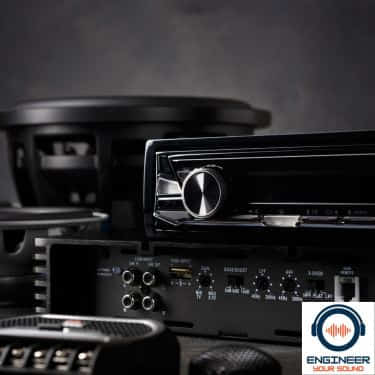The terms ‘PA system’, ‘amplifiers’, and ‘speakers’ are used interchangeably when working with live sound. It can quickly become confusing for those who know little about sound systems. It is common to question what you need and what you should be using.
However, a PA system and an amplifier are different.
A PA system includes multiple components like microphones, speakers, mixers, and amplifiers, all working together to amplify sound for public address. On the other hand, an amplifier is a standalone device that increases the power of an audio signal.
In this article, I will explain in simple terms what a PA system is, what an amplifier is, and which one you need for your application.

What Exactly Is A PA Sound System?
A PA (Public Address) sound system is a set of audio equipment that allows sounds to be broadcast to larger groups of people. Specifically designed for public use, PA systems are commonly found in environments such as schools, churches, and concert venues, where sound clarity is paramount.
The core components of a PA system include:
- Microphones to capture sound.
- Mixers to balance and adjust audio signals.
- Amplifiers to boost these signals.
- Speakers to project the sound to the audience.
The complexity and size of the PA system may vary based on the venue’s size and the event’s specific needs.
What Exactly Is An Amplifier?
An amplifier, in simplest terms, is an electronic device designed to boost the power, voltage, or current of an audio signal, making it stronger and louder.
An amplifier takes a weak audio signal – that wouldn’t be able to power a speaker – and increases its amplitude, enabling it to drive the speaker and provide a much louder sound.
There are various types of amplifiers, including tube, solid-state, and digital amplifiers, each with unique characteristics and uses. They are employed in various audio equipment such as home audio systems, car stereos, and musical instruments.
It’s important to note that while an amplifier can increase sound volume, it doesn’t necessarily improve sound quality. The goal of a good amplifier is to amplify the signal without distorting it or adding noise.
Is A PA System The Same As An Amplifier?
In a nutshell, a PA system is not the same as an amplifier. While both play roles in amplifying and delivering sound, their functions and complexities differ.
An amplifier is a part of a PA system, increasing the power of sound signals. However, a PA system is a more comprehensive setup that includes an amplifier and other components like microphones, mixers, and speakers, all working in unison to capture, adjust, amplify, and project sound.
An amplifier is a component, while a PA system is the whole sound-producing machine.
You can think of it like a car engine and a car. The engine (amplifier) is a critical part of the car (PA system), but it isn’t the entire car itself. The car also includes other components like the steering wheel, wheels, and seats, all working together to get you from point A to point B.
In conclusion, while you need an amplifier as part of your PA system, they are different. Each has its unique place and role in the process of sound production and projection.
Do I Need An Amplifier With A PA System?
Based on my experience, whether you need an amplifier with your PA system depends on your specific needs, the type of PA system you have, and the venue size.
An amplifier is essential if your PA system is a “passive” system, meaning the speakers require an external power source. The amplifier will provide the necessary power to the speakers, enabling them to produce sound.
On the other hand, if your PA system is an “active” or “powered” system, the speakers have built-in amplifiers, and you do not need a separate amplifier. These systems are plug-and-play, making them convenient and easy to set up.
For small venues or events, a powered PA system may be sufficient. However, for larger venues or events requiring more complex sound needs, you may need a passive system with a separate amplifier for more control over the sound.
Remember, it is not about having an amplifier but about your specific sound requirements. It’s essential to understand your needs first and choose the right equipment accordingly.
When Do I Need A PA System?
Whether or not you need a PA system depends on your specific audio needs. If you find yourself in a situation where you need to amplify sound to a larger audience, a PA system is likely necessary.
Here are a few scenarios where a PA system can be beneficial:
- Events and Gatherings: Whether it’s a wedding, a conference, a concert, or a festival, any event with a large audience will typically require a PA system to ensure sound is distributed evenly and everyone can hear properly.
- Public Speaking: If you are delivering a speech or lecture in a large hall or auditorium, a PA system is crucial to ensure that your voice is carried to the back of the room.
- Musical Performances: For live musical performances, especially in larger venues, a PA system is used to amplify the music so everyone in the audience can enjoy it. This includes concerts, festivals, and nightclub performances.
- Education Settings: Schools and universities often use PA systems for assemblies, lectures, and performances. They can be particularly useful in large lecture halls or outdoor spaces.
- Commercial Spaces: Retail stores, restaurants, and other commercial spaces often use PA systems for background music or to make customer announcements.
Remember, the size and complexity of the PA system you need will depend on the size of the venue and the specific sound requirements. It’s always best to consult a sound professional to get the right system for your needs.
When Do I Need A Dedicated Amplifier?
The need for a dedicated amplifier isn’t always a given and largely depends on your specific audio requirements and the nature of your PA system.
Here are some situations in which you may need a dedicated amplifier:
- Passive PA Systems: If you use a passive PA system, which requires an external power source to drive the speakers, you’ll need a dedicated amplifier. (Assuming you are not using a mixing desk with a built-in amplifier).
- Large-Scale Events: The built-in amplifiers in active systems may not suffice for large-scale events or venues. A dedicated amplifier can provide the extra power to deliver clear, loud sound across a large space.
- Professional Sound Quality: A dedicated amplifier can offer more control over the sound output if you are an audiophile or require professional-grade sound quality for a music concert or studio recording.
- Upgrading Your System: If you wish to upgrade your existing PA system for better sound quality or louder volumes, adding a dedicated amplifier can be a cost-effective way to enhance your system without replacing the entire setup. However, this might be a waste of money if you don’t get an amplifier that matches your system. Speak to a professional audio salesperson before dropping an external amplifier into your PA setup to ensure the new amplifier will enhance sound.
As mentioned, consulting with a sound professional is essential to understand whether a dedicated amplifier is necessary for your specific audio needs. And remember, the goal is not just to amplify sound but to maintain sound quality and clarity.
Final Thoughts
To sum up, PA systems and amplifiers are integral components of sound production, each with distinct roles.
While a PA system is a comprehensive setup encompassing an array of components, an amplifier, responsible for magnifying sound, is a key part of that setup.
The necessity of an amplifier with a PA system depends on your specific needs, the type of PA system in place, and the venue size.
Understanding the nuances of these sound equipment pieces and consulting with a sound professional can assist you in making the right decision for your audio needs.
Whether for an event, public speaking, musical performance, educational setting, or commercial space, the focus should always be on ensuring sound quality and clarity.
